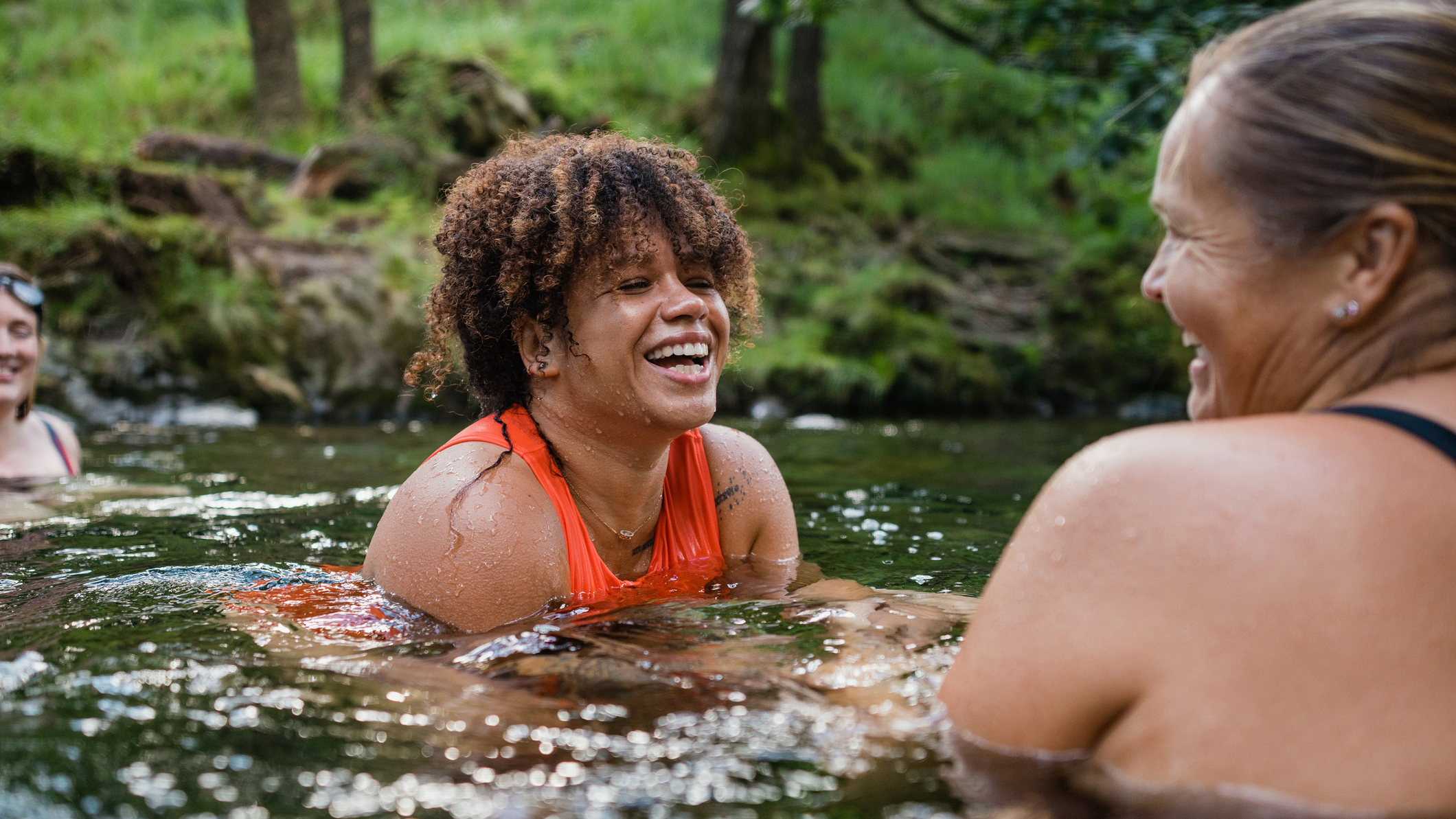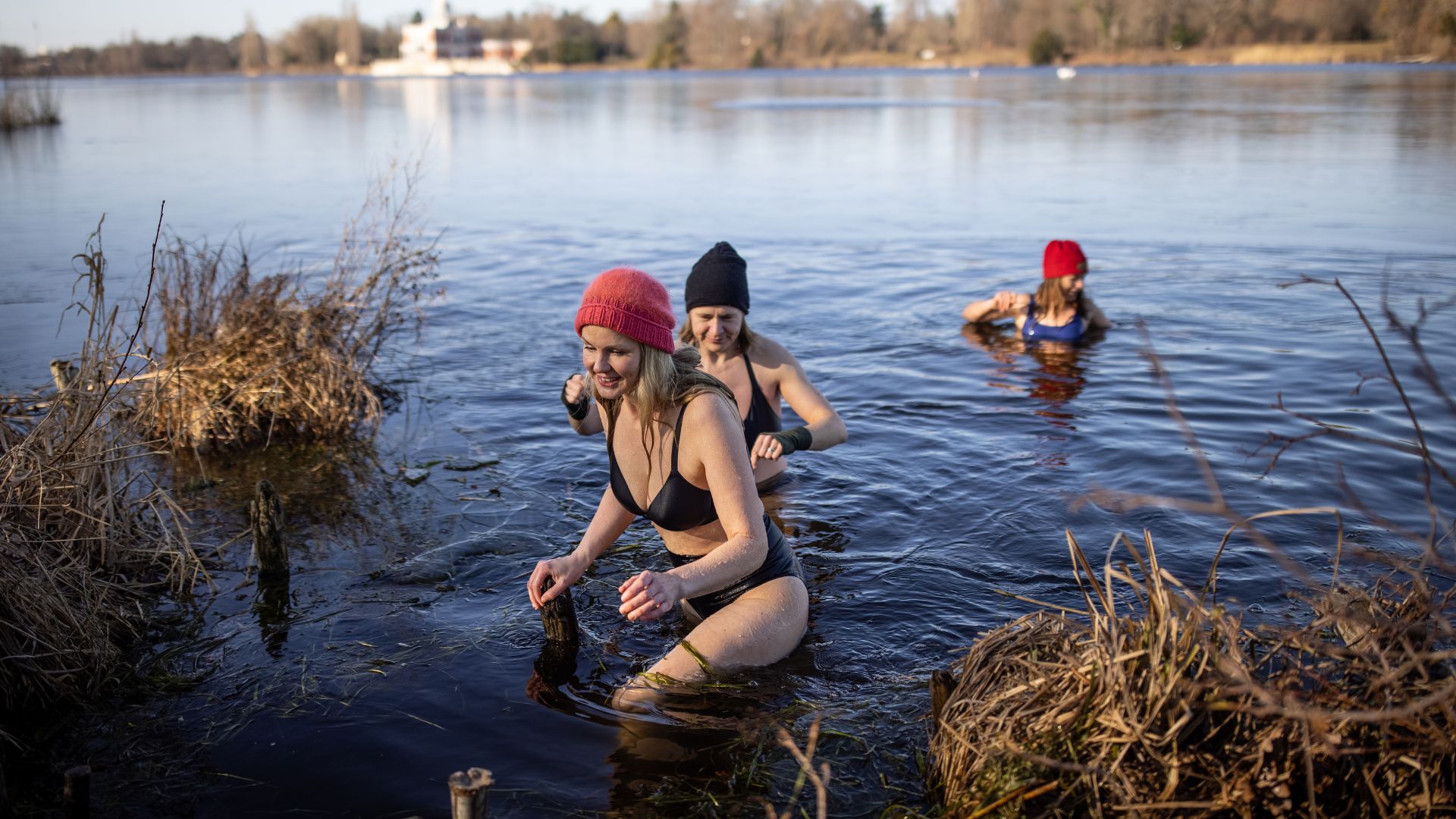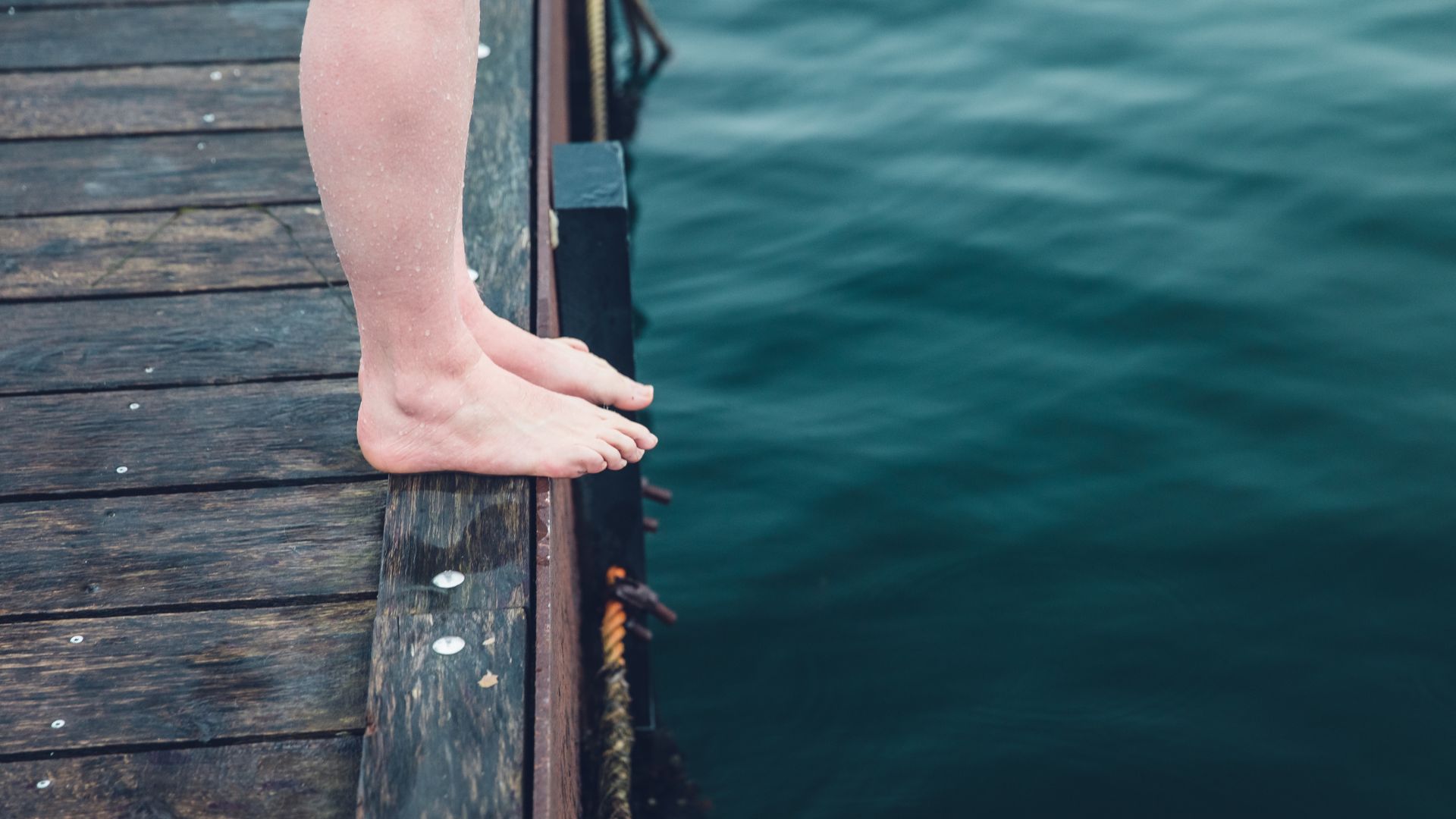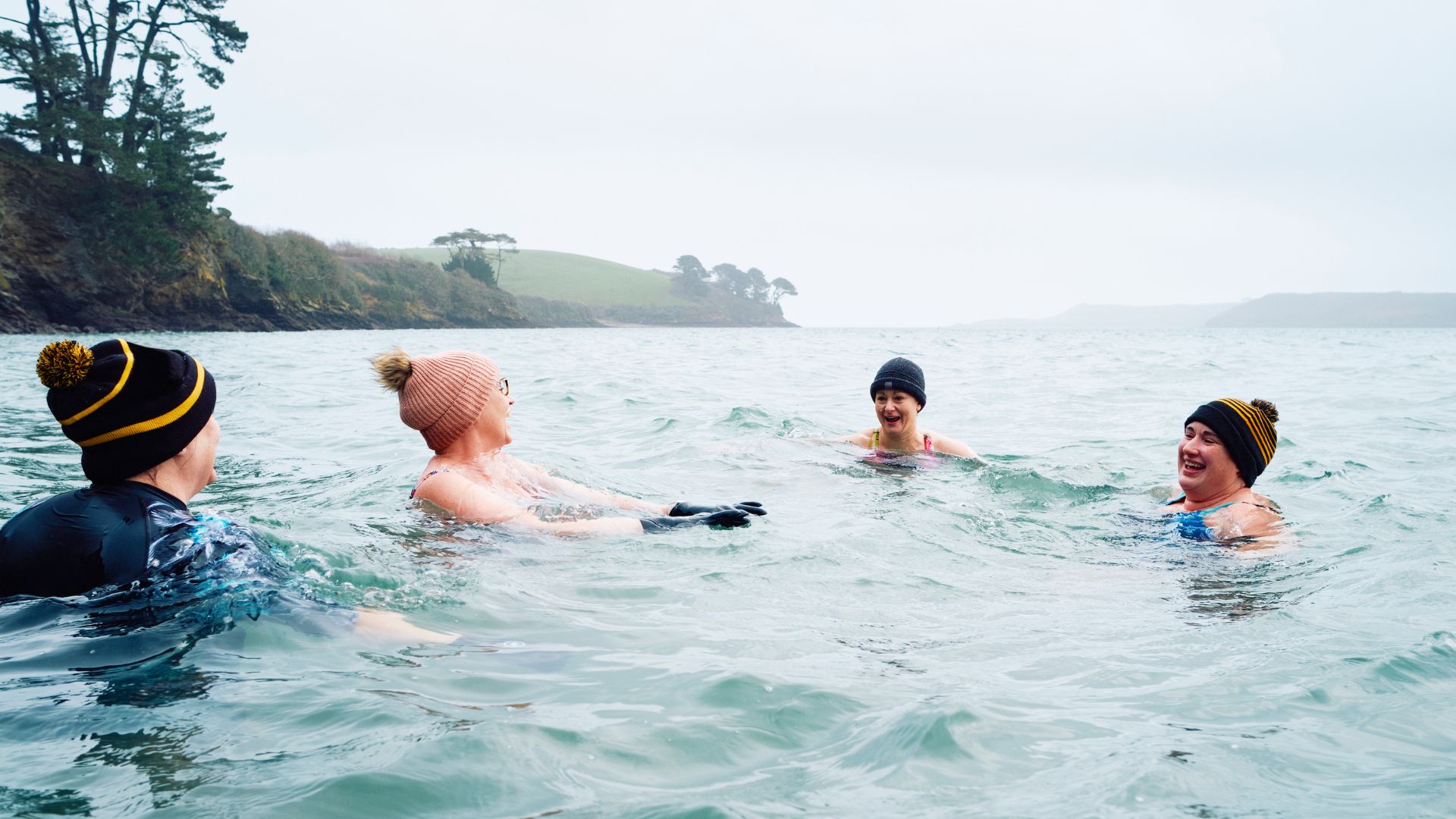The real benefits of cold water swimming, revealed by health experts
A cold water plunge is a real tonic. We discuss the many benefits of cold water swimming with health experts and why an icy dip is so good for you


Although it may initially be a shock to the system, the benefits of cold water swimming are praised by health experts worldwide. Not only does it offer the chance to get outdoors, enjoy some fresh air, and take in some exercise, but regular dips can have an overwhelmingly positive impact on our mental health.
Cold water swimming, open water swimming, or wild swimming - as it's often called - has become one of the longest-standing health trends over the last couple of years with over 7.5 million of us taking to ponds, lakes, lochs, rivers, and seas every year, per surveys by the Outdoor Swimming Society. While it's always been popular, with literature going back to ancient times reviewing the positive effects of cold water on the body, more of us are taking on the challenge than ever before.
But is this trend really all it's cracked up to be? We speak to those who've just started wild swimming, long-term practitioners, daily ice bath converts, and various health experts to reveal why this fitness trend isn't going anywhere soon - and nor should it.
What are the benefits of cold water swimming?
1. Cold water swimming is an instant mood booster
“Apart from the reputed physical benefits of cold-water swimming, the emotional benefits are hard to overstate," says Kristy Field, a cold-water swimming devotee and the co-founder of Wiltshire Wild Swim. "The (enjoyable) pain of plunging into cold water is rewarded with a tsunami of endorphins, and afterwards, you feel happy as a clam. Plus, once you’ve swum in a 4°C pond, you can take on anything the day throws at you."
When endorphins - hormones created in response to stressors that help us relieve pain and improve our general wellbeing - attach to the brain's reward centres, they trigger dopamine release. Also called the 'cuddle hormone', a study by Charles University found that cold-water immersion can boost dopamine levels by 530%, making it one of the biggest benefits of swimming in cold water.
This is something that keen cold water swimmer, Sally Sellwood, can relate to. "I love cold water swimming because it never fails to make me feel invincible - even for a short period. It helps me deal with work, teenagers, and everything that life throws my way. I've never once regretted going for a swim. Now, I often make time to go for a swim when I might not otherwise have planned it. It's almost impossible to describe the calm feeling I get when entering the water, pushing through the initial excruciating cold to the point of full immersion."
While the mood boost that comes with cold-water swimming may be almost instant, research shows that its positive effects stand the test of time. A study by University College London found that it can be used effectively to treat some cases of depression, for instance. In this study, the researchers reviewed the case of a 24-year-old woman who had been dealing with depression and anxiety since she was 17. Various antidepressant medications were ineffective. They gave her a program of weekly cold water swimming and found a mood improvement immediately following each swim and a sustained positive reduction in symptoms of depression over time. One year later, the young woman was still medication-free.
Sign up to our free daily email for the latest royal and entertainment news, interesting opinion, expert advice on styling and beauty trends, and no-nonsense guides to the health and wellness questions you want answered.
2. Shocking the system jump starts your metabolism
The same study by Charles University discovered that cold-water therapy can also increase your metabolism - the process that transforms what you eat into energy - by as much as 350%. As another study by NUTRIM in the Netherlands reveals, this is because cold water produces a state called cold-induced thermogenesis, where your body is actively using more energy to try and bring up your internal temperature in response to the temperature change.
While there are plenty of health benefits associated with a higher metabolic rate, it's particularly of interest to those who want to lose weight without dieting. A higher metabolic rate means you can burn more calories via non-exercise-related daily activities like sitting, eating and sleeping.
The study also found that more brown fat - also known as brown adipose tissue - is produced by humans in cold temperatures. Brown fat contains more mitochondria (a type of cell), which act as 'engines' to burn calories and produce heat.
3. Wild swimming a full-body workout
"Swimming is one of the most beneficial exercises for people of all ages because it provides a workout for your whole body," says Sonia Khan, a senior pharmacist specialising in women's health at Medicine Direct. "When doing swimming as a workout, your arms, legs, feet, and hands are all needed to stay afloat and move around. For this reason, it makes it a great form of exercise."
However, if you decide that a chilly dip isn't for you, it's also worth noting that any kind of swimming is an effective cardio and strength training workout. It's just that adding the complication of cold water makes the movement more strenuous since your body is also working harder to keep you warm at the same time.
Plus, the added weight of swimming boots, gloves, and (potentially) a wetsuit adds to the challenge of open-water swimming and burns more calories. As well as aiding weight loss, this kind of intensive workout is also one of the best sleep aids.

4. Improved cardiovascular health
According to David Sautter, NASM-certified personal trainer, one of the top physical benefits of cold water exercise is "improved cardiovascular health through giving our heart and lungs a workout".
However, if you're not prepared for the challenge, you may run into issues. “Breathing in open water is going to require some getting used to," he warns. "You’ll need to try to experiment with breathing on both sides of the body instead of the one side you're accustomed to, and learn how to breathe better generally. Your body might require some getting used to water temperature so I’d recommend starting with a wetsuit, which will dramatically cut down on the cold.”
5. Cold water swimming helps maintain your immune system
While the link between cold water swimming and maintaining the immune system isn't entirely conclusive, there's mounting research to suggest that those who go wild swimming regularly are more resistant to certain illnesses and infections.
Several studies, including two carried out by Jerzy Kukuczka Academy of Physical Education and Istituto Ortopedico Galeazzi, have found that cold water immersion reinvigorates the immune system by forcing it to produce more white blood cells and antioxidants to fight against the new stressor. However, like most research on cold water therapy, more studies are needed to validate these findings.

6. Reduced pain and inflammation
It's no secret that cold temperatures can be used as natural pain relief. An ice pack is the first port of call to reduce swelling and athletes take regular ice baths to help prevent muscular injuries, so this isn't without a solid foundation. A group of researchers from Hong Kong Polytechnic University also found that cold-water immersion after exercise can lead to decreased inflammation and pain for up to 24 hours a workout.
However, when it comes to tackling chronic pain, much of the evidence citing the healing effects of cold-water swimming is anecdotal, as Anna Deacon and Vicky Allan found when researching Taking The Plunge. They write, "Back in the 18th century, sea swimming, especially during winter, was recommended for the treatment of a range of diseases. Whole seaside resorts were founded on these perceived health benefits. We still, centuries later, await firm scientific evidence."
But the anecdotes of the healing properties of cold water remain firm. "Dawn [a regular wild swimmer who previously struggled with constant pain due to a genetic back condition], for instance, experienced a phenomenal turnaround. She went from struggling to walk to hiking up to the shelter hut halfway up Ben Nevis and summiting the iconic Suilven."
7. Wild swimming is effective ecotherapy
We're fully acquainted with the benefits of nature, with walking meditation now a very popular version of the classic mindfulness method. Whether you want to reap the benefits of swimming in the sea or take in the serenity of a still lake, cold water swimming offers up some idyllic landscapes and can lead to a similarly relaxed mindset.
"A large part of the effect is the beauty of being outside in nature, especially for those of us who live in a city," says cold water enthusiast and former woman&home editor Miranda McMinn. "I’ve swum alongside a brilliant blue kingfisher darting from branch to branch. The resident heron at the lake has swooped to land above my head. There are flocks of electric green parakeets and the unfolding annual soap opera of whether the mallard ducklings and moorhen chicks will get eaten by the carp. And that’s all on top of the startling beauty of the changing seasons in the trees."
Between lengths, or while warming up after a quick plunge, taking a moment to observe the wild and natural habitat around you can truly help you to slow down and effectively connect with nature. It's one of the ways to lower your cortisol levels, beating stress and helping to alleviate the early symptoms of depression. It could even help prevent future panic attacks, research from the University of Oulu suggests.

8. It builds a sense of community
Perhaps one of the most appealing benefits of cold-water swimming is the sense of community it brings. “The group offers mutual support that goes well beyond swimming,” Field tells us. “The other side to swimming is that we’re a communal support group. Lots of us joined at difficult times, struggling with different areas of our lives. We’re like family, a swim family."
For Field, cold water and wild swimming also encourage self-acceptance and body confidence. “There’s nothing like seeing a lot of other midlife women in the buff to make you feel normal. There’s seldom a G-string in sight - just a lot of sensible pants and necessary fleeces."
"I am also constantly buoyed up by the sense of camaraderie," she adds. "It’s like a club for women who put vanity aside for the sheer joy of the experience. I feel inspired by the 70 and 80-somethings who come regularly. It gives me a sense of hope for active enjoyment of old age."
Why is cold water swimming so good for you?
Mark Harper, a consultant anesthetist and cold-water swimmer himself, is part of the team at the University of Portsmouth driving research into the benefits of cold-water immersion. He explains that when the face is submerged in cold water, "messages are sent out through the parasympathetic nervous system that put your organs into 'rest and digest' mode, lowering heart rate and reducing inflammation. This is the opposite of 'fight or flight', so we become completely relaxed. As a result, chemicals such as serotonin and noradrenaline are released into the bloodstream, which is believed to create pain-inhibiting pathways in the brain," he explains.
Cold-water therapy is nothing new with its origins tracing back to Ancient Greece and the principles of thermal medicine, according to historic research by the University G. Marconi of Rome. Here the water was used at different temperatures to soothe muscle fatigue and other health ailments. In fact, Hippocrates himself was the earliest recorded champion of an ice-cold plunge. In documented his experiences with the 'magic waters' for reducing pain, a technique that undoubtedly led to explorations into modern-day hydrotherapy.
Nowadays, the benefits of cold-water therapy - also known as cold hydrotherapy - are accessed through cold showers, plunge pools, and of course, cold-water swimming.

A dryrobe can be a great addition to your swim kit if you're swimming outdoors. The Advanced Long Sleeve by Dryrobe is one of the best as you can peel off your layers underneath and get warm with the 100% synthetic lambswool lining. It also comes in various colours.

Equally, a pair of neoprene gloves can keep you moving in colder waters, preventing your fingers and hands from getting too cold. As our fingers and toes are furthest from the heart, exposing these suddenly to very cold water can be uncomfortable at best since it takes longer for blood circulation to reach these areas.
Safety considerations for cold water swimming
Want to give it a go? Of course, you have to be sensible. Cold-water swimming can be dangerous and cause cold shock (particularly if you're not acclimatised to the temperature), as well as hypothermia in some extreme conditions. Common sense dictates you shouldn’t just jump headfirst into a freezing pond in the middle of January without any preparation. Talk to a lifeguard at your local lido, ponds, or on a beach near you before attempting a swim and (where possible) complete a cold-water induction session before getting started.
Most community groups operate by the legal framework set out in the Outdoor Swimming Society Swim Responsibility Statement. This essentially means that swimmers are individually responsible for their safety when swimming with groups and cannot rely on information or advice given by members.
“With an informal group, an individual’s safety is nobody’s responsibility but their own," Field tells us. "There are probably no lifeguards in the group and the other swimmers are fairly occupied looking after themselves, so individuals must understand that they are solely responsible for their wellbeing and safety."
When you are ready to take the plunge, it's important to remember:
- Wear adequate protection: If swimming in winter, invest in a good-quality wetsuit, neoprene gloves, and boots, as well as a woolly hat.
- Acclimatise: It's easier to start your new hobby in the summer months, when waters are warmer, and build up a tolerance over time. Entering waters below 10°C can create a shock response and cause rapid breathing, as well as numbness and pain in the hands and feet. You could also introduce cold showers or baths into your daily routine to get your body used to the idea. Take a look at the Outdoor Swim Society's acclimatization guide for more information.
- Warm-up immediately: It's important to warm up straight away and stay warm for 20-30 minutes after leaving the water. Remove all cold and wet clothing, wrap up in insulated layers and sip on a hot drink after your swim.
- Focus on breathing: In colder temperatures, your breathing may become quicker and shallow, so it's important to have some calming breathing techniques in mind to help you relax. The Wim Hof breathing technique - which involves controlled breathwork to relax your mind and body - may come in useful.
- Don't stay in too long: Particularly if you're new to cold-water swimming. A couple of minutes is enough to reap the benefits.
- Get some rest: Open-water swimming is a vigorous activity that should be followed by some downtime. Make sure you take the time to recover, ensuring you get all the types of rest you need.
- Be wary of the risks: The Outdoor Swimming Society advises getting expert medical advice before winter swimming if you have a heart condition, high blood pressure, asthma, or are pregnant.
Lauren is the former Deputy Digital Editor at woman&home and became a journalist mainly because she enjoys being nosy. With a background in features journalism, Lauren worked on the woman&home brand for four years before going freelance. Before woman&home Lauren worked across a variety of women's lifestyle titles, including GoodTo, Woman's Own, and Woman magazine.

